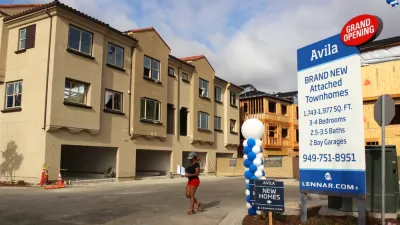"Rules established in another era need to be rethought, " said Xavier de Sousa Briggs, associate director of the White House Office of Management and Budget this weekend in Cambridge. Briggs' job touches almost everything, from the postal service to the Department of Homeland Security, and it was admittedly exciting to see someone with an urban planning background in such a powerful position. Briggs spoke at lightning speed, and I could almost see the multitude of invisible connections going into his brain and back out to the White House. Much of what he's working on, he explained, is taking "old stovepipes" -- government agencies that have worked in silos for decades -- and making them talk to each other.
"Rules established in another era need to be rethought, " said Xavier de Sousa Briggs, associate director of the White House Office of Management and Budget this weekend in Cambridge. Briggs' job touches almost everything, from the postal service to the Department of Homeland Security, and it was admittedly exciting to see someone with an urban planning background in such a powerful position. Briggs spoke at lightning speed, and I could almost see the multitude of invisible connections going into his brain and back out to the White House. Much of what he's working on, he explained, is taking "old stovepipes" -- government agencies that have worked in silos for decades -- and making them talk to each other.
Briggs was one of many speakers brought together by the Lincoln Institute of Land Policy for the "Forum on Land and the Built Environment: The Next City." The occasion was the Institute's yearly outreach to journalists covering the urban beat, and a clutch of old school reporters showed up to learn and share war stories.
And in many ways, the story of the weekend has more to do with the attendees than the event itself. Just that Wednesday, Blair Kamin of the Chicago Tribune explained, 53 of his colleagues had been let go -- including a seasoned urban affairs reporter that had worked closely with Kamin on an in-depth examination of Daniel Burnham's Chicago plan. Another attendee was enjoying a fellowship with Harvard's Nieman Foundation for Journalism (a co-presenter, along with the Harvard Graduate School of Design), only to find that she had no job to go back to; her paper, the Seattle Post-Intelligencer, folded in mid-March. The looming threat of obsolescence colored every discussion of urban policy, transportation funding and the like. When Briggs finished his blistering presentation, the first question from moderator Alec MacGillis of The Washington Post was, "While you're saving the auto industry and the banking system, does the Obama administration give any thought to saving another dying industry- ours?"
Of course, the economic crisis and the American Recovery and Reinvestment Act loomed large throughout the weekend. Questions for Briggs centered around the administration's insistence on shovel-ready projects, and how that may have inadvertently led to funding for projects that are actually damaging to cities and smart growth. Briggs admitted the limitations of the stimulus funding process, but insisted that there will be more money ahead for thoughtful investment in infrastructure.
Streams of negative data poured from PowerPoint presentations, even as the speakers presented hopeful visions. Chip Case, an expert in housing, gave an insightful review of the depressed market and the trillions in lost value over the past year. Against expectations, he believes that real estate will make a comeback as soon as the end of this year due to pent up demand from growing populations and a restricted supply. But, he admits, "One thing that is absolutely true is that there is more uncertainty now than at any other time." Meanwhile, he predicts that the commercial real estate market will begin its own crash in the next few weeks and will dominate the coverage of the crisis.
One ray of hope came from Douglas Foy, CEO of SerraFix, a sort of incubator for green business. Foy looks at inefficiencies in energy transmission and deployment and sees jobs and opportunity. "Too many utilities look at energy as an operating cost rather than as a strategic asset," says Foy, suggesting that energy savings could be a huge creator of new revenue. Foy also predicts that agriculture will begin moving closer to cities as the current system of shipping produce around the world becomes more costly. Again, Foy sees an opportunity for lemonade from lemons, as he advocates growing crops next to power plants to utilize the excess heat they generate.
Everyone admitted that the challenge of the immediate future will be getting local, state, regional and federal governments to cooperate. Governor Michael Dukakis, formerly an Amtrak board member, expressed his excitement at the Obama administration's high-speed rail plans, but says that the local and state levels "aren't ready for it," and lack the expertise necessary to do it correctly and fast. "We have an extraordinary network of railroad rights-of-way around the country," he said. "This is not difficult. But we've got to get a move on."
Overall, the weekend was a chance to meet some of the people that do the reporting that makes Planetizen a vital resource: reporters and critics like John King at the San Francisco Chronicle, James Russell at Bloomberg News, and David Owen at The New Yorker. Their work sheds light on urban issues across the country and helps people understand the built environment and its impact. I hope they all land on their feet as the new economy takes shape around them.

Planetizen Federal Action Tracker
A weekly monitor of how Trump’s orders and actions are impacting planners and planning in America.

Map: Where Senate Republicans Want to Sell Your Public Lands
For public land advocates, the Senate Republicans’ proposal to sell millions of acres of public land in the West is “the biggest fight of their careers.”

Restaurant Patios Were a Pandemic Win — Why Were They so Hard to Keep?
Social distancing requirements and changes in travel patterns prompted cities to pilot new uses for street and sidewalk space. Then it got complicated.

Maui's Vacation Rental Debate Turns Ugly
Verbal attacks, misinformation campaigns and fistfights plague a high-stakes debate to convert thousands of vacation rentals into long-term housing.

San Francisco Suspends Traffic Calming Amidst Record Deaths
Citing “a challenging fiscal landscape,” the city will cease the program on the heels of 42 traffic deaths, including 24 pedestrians.

California Homeless Arrests, Citations Spike After Ruling
An investigation reveals that anti-homeless actions increased up to 500% after Grants Pass v. Johnson — even in cities claiming no policy change.
Urban Design for Planners 1: Software Tools
This six-course series explores essential urban design concepts using open source software and equips planners with the tools they need to participate fully in the urban design process.
Planning for Universal Design
Learn the tools for implementing Universal Design in planning regulations.
Heyer Gruel & Associates PA
JM Goldson LLC
Custer County Colorado
City of Camden Redevelopment Agency
City of Astoria
Transportation Research & Education Center (TREC) at Portland State University
Camden Redevelopment Agency
City of Claremont
Municipality of Princeton (NJ)






























